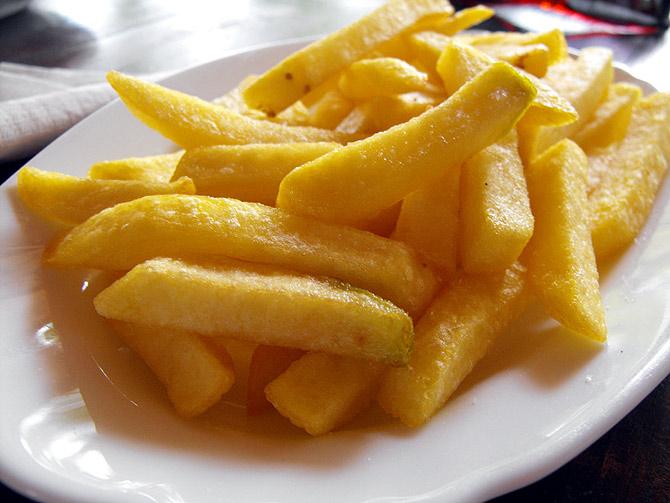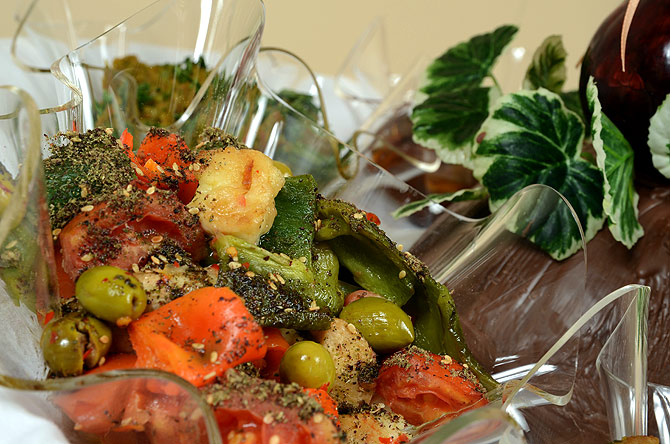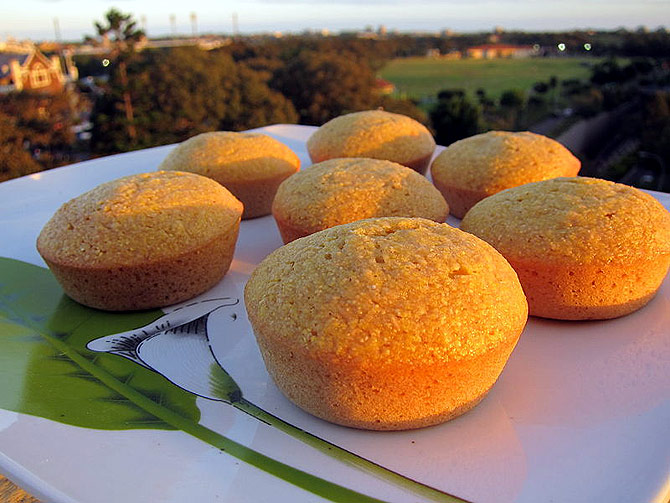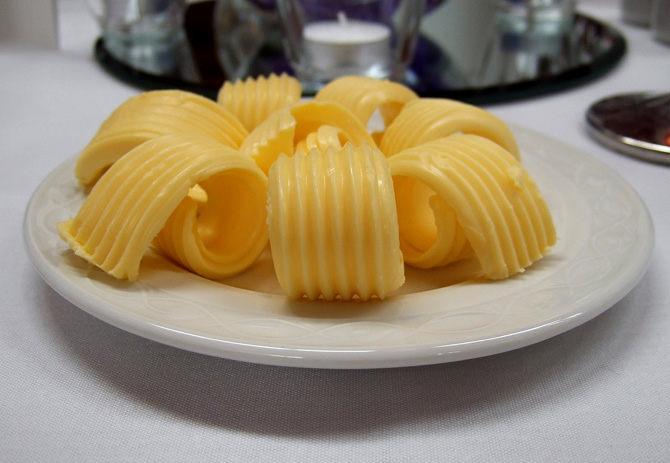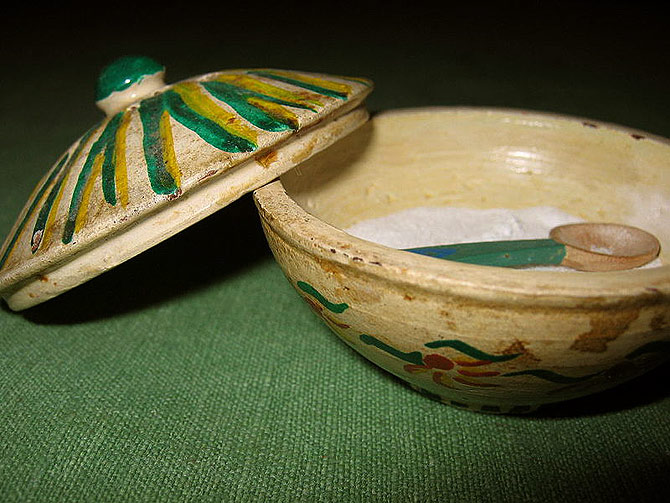 | « Back to article | Print this article |
These foods are BAD for your heart!
- How do you make low-salt butter at home?
- Are egg yolks good or bad? What about low-sodium canned vegetables?
- Should you have granola bars at all?
Charmaine D'Souza's book Kitchen Clinic has all these answers and more.
We bring you an exclusive excerpt from the book:
Charmaine D'Souza is a dietician to the stars. Karan Johar consults her, as do Rani Mukerji abd Neetu Singh Kapoor. D'Souza also counts among her clients corporate biggies such as Naresh Goyal of Jet Airways and Yash Birla among others.
In her first book, Kitchen Clinic, D'Souza lists out simple home remedies that will help you keep minor ailments at bay as well as control and prevent major illnesses.
So what does it take to have a healthy heart? What foods must you consume more actively and more importantly which foods must be out of your menu right away?
In the pages to follow, we bring you an exclusive extract from the book on how you can keep your heart alive and kicking. As it turns out, the easiest remedies for the heart lie hidden in our kitchens.
Read on and you'll be surprised
What is a heart-healthy diet?
Changing your eating habits can be tough. Start with these eight strategies to work your way towards a heart healthy.
Although you might know that eating certain foods can increase your heart disease risk, it's often tough to change your eating habits.
Once you know which foods to eat more of and which foods to limit, you'll be on your way toward a heart healthy.
1. Control your portion size
How much you eat is just as important as what you eat.
Overloading your plate, taking seconds and eating until you feel stuffed can lead to eating more calories, fat and cholesterol than you should.
Keep track of the number of servings you eat -- and use proper serving sizes -- to help control your portions.
Excerpted from Kitchen Clinic by Charmaine D'Souza with kind permission from Random House, India, (Rs 250)
Purchase a copy of Kitchen Clinic from Rediff Books here!
These foods are BAD for your heart!
2. Eat more vegetables and fruits
Vegetables and fruits are good sources of vitamins and minerals.
They are also low in calories and rich in dietary fibre.
Eating more fruits and vegetables will help you eat less high-fat foods, such as meat, cheese, and junk food.
Keep vegetables washed and cut in your refrigerator for quick snacks. Choose recipes that have vegetables or fruits as the main ingredient, such as vegetable stir fry or fresh fruit mixed into salads.
Fruits and vegetables to choose:
- Fresh or frozen vegetables and fruits
- Low-sodium canned vegetables
- Canned fruit packed in juice or water
Fruits and vegetables to avoid
- Coconut as well as tender coconut meal (malai)
- Vegetables with creamy sauces
- Fried or breaded vegetables
- Canned fruit packed in heavy syrup
- Frozen fruit with sugar added
Note: However, please remember that a glass of coconut water should be consumed for the high potassium content.
These foods are BAD for your heart!
3. Wholegrains
Wholegrains are good sources of fibre and other nutrients that play a role in regulating blood pressure and heart health.
Be adventurous and try a new wholegrain, such as couscous, quinoa, or barley.
Another easy way to add wholegrains to your diet is ground flaxseed. They can lower your total blood cholesterol.
You can grind the seeds and stir a teaspoon of them into your food.
Grain products to choose
- Wholewheat flour
- Wholegrain bread
- High-fibre cereal with 5 gm or more of fibre in a serving
Grain products to limit or avoid
- White, refined flour
- White bread (maida bread) and brown bread (it is generally coloured with caramel/brown colour)
Grain products to choose
- Wholegrains such as brown rice, barley, and buckwheat (kasha/kuttu)
- Wholegrain pasta
- Oatmeal (steel cut or regular)
- Ground flaxseed
Grain products to limit or avoid
- Muffins
- Frozen waffles
- Corn bread
- Doughnuts
- Biscuits
- Granola bars
- Cakes
- Pies
- Egg noodles
- Buttered popcorn
- High-fat snack crackers
These foods are BAD for your heart!
4. Limit unhealthy fats and cholesterol
Limiting how much saturated and trans fats you eat is an important step to reduce your blood cholesterol and lower your risk of coronary artery disease.
Remedy to lower LDL
A combination of fenugreek seeds, dried fenugreek leaves, flaxseeds, chia seeds, dried mint powder, dried celery, and jeera will help with bringing down LDL cholesterol levels considerably.
The best way to reduce saturated and trans fats in your diet is to limit the amount of solid fats -- butter, margarine and shortening -- you add to food when cooking and serving.
You can also reduce the amount of saturated fat in your diet by trimming fat off your meat or choosing lean meats with less than 10 per cent fat.
Polyunsaturated fats, found in nuts and seeds, also are good choices for a heart healthy. When used in place of saturated fat, monounsaturated and polyunsaturated fats may help lower your total blood cholesterol. But moderation is essential. All types of fat are high in calories.
Fats to choose
- Olive oil
- Safflower oil
- Sunflower oil
- Sesame oil
- Peanut oil
- Mustard oil
- Rice bran oil
Fats to limit
- Butter
- Lard
- Bacon fat
- Gravy
- Cream sauce
- Non-dairy creamers
- Hydrogenated margarine and shortening
- Cocoa butter, found in chocolate
- Coconut, palm, cottonseed and palmkernel oils
These foods are BAD for your heart!
5. Choose low-fat protein sources
Lean meat, poultry, and fish, low-fat dairy products, and egg whites or egg substitutes are some of your best sources of protein.
You'll find the highest amounts of Omega-3 fatty acids in cold-water fish, such as salmon, mackerel, and herring.
Other sources are flaxseed, walnuts, soybeans, and canola oil. Beans, peas, and lentils are also good sources of protein and contain less fat and no cholesterol, making them good substitutes for meat.
Substituting plant protein for animal protein -- for example, a soy or bean burger for a hamburger -- will reduce your fat and cholesterol intake.
Proteins to choose
- Low-fat dairy products such as skim or low-fat (1 per cent) milk, yoghurt, and cheese
- Egg whites or egg substitutes
- Fish such as salmon
- Skinless poultry
- Legumes
- Soybeans and soy products, for example, soy burgers and tofu
- Lean ground meats
Proteins to limit or avoid
- Full-fat milk and other dairy products
- Organ meats, such as liver
- Egg yolks
- Fatty meats
- Spare ribs
- Cold cuts
- Hot dogs and sausages
- Bacon
- Fried or breaded meats
These foods are BAD for your heart!
6. Reduce the sodium in your food
Reducing sodium is an essential part of a heart healthy. It is recommended that: fit adults have no more than a teaspoon a day people aged 51 or older, people who have been detected with high BP, diabetes, or chronic kidney disease have no more than 1,500 mg of sodium a day.
But a good deal of the salt you consume comes from canned or processed foods, like soups and frozen dinners.
Eating fresh foods and cooking your own soups and stews can decrease the amount of salt you ingest.
Be distrustful of foods that say they are lower in sodium since they are seasoned with sea salt instead of regular table salt -- sea salt actually has the identical nutritional value as regular salt.
Low-salt items to choose
- Herbs and spices
- Salt substitutes
- You could also make a low salt butter at home by keeping a 100 gm slab of butter in a bowl of iced water overnight in the fridge
High-salt items to avoid
- Table salt
- Canned soups and prepared foods, such as frozen dinners, ready-to-eat, and packaged meals
- Tomato juice
- Soy sauce
Be heart healthy:
- Have 1 tbsp ground flax daily. If you are eating flaxseed, then ensure that you chew the seeds well. If you are eating flax seeds for their Omega 3 fatty acid content, then eat the food they are in within a few days because the oil will degrade. Eat as is or add to salads, dips, dressings etc.
- Chia seeds also have heart-healthy benefits. Soak 1 tbsp of chia in water for 20 minutes, then consume as is or incorporate into smoothies / milkshakes / chaas.
- Snack on 2 to 3 walnuts, 1 tbsp of sunflower seeds/melon seeds/pumpkin seeds, 6 to 7 unsalted pistachios and 1 fig in the evening.
Excerpted from Kitchen Clinic by Charmaine D'Souza with kind permission from Random House, India, (Rs 250)
Purchase a copy of Kitchen Clinic from Rediff Books here!
